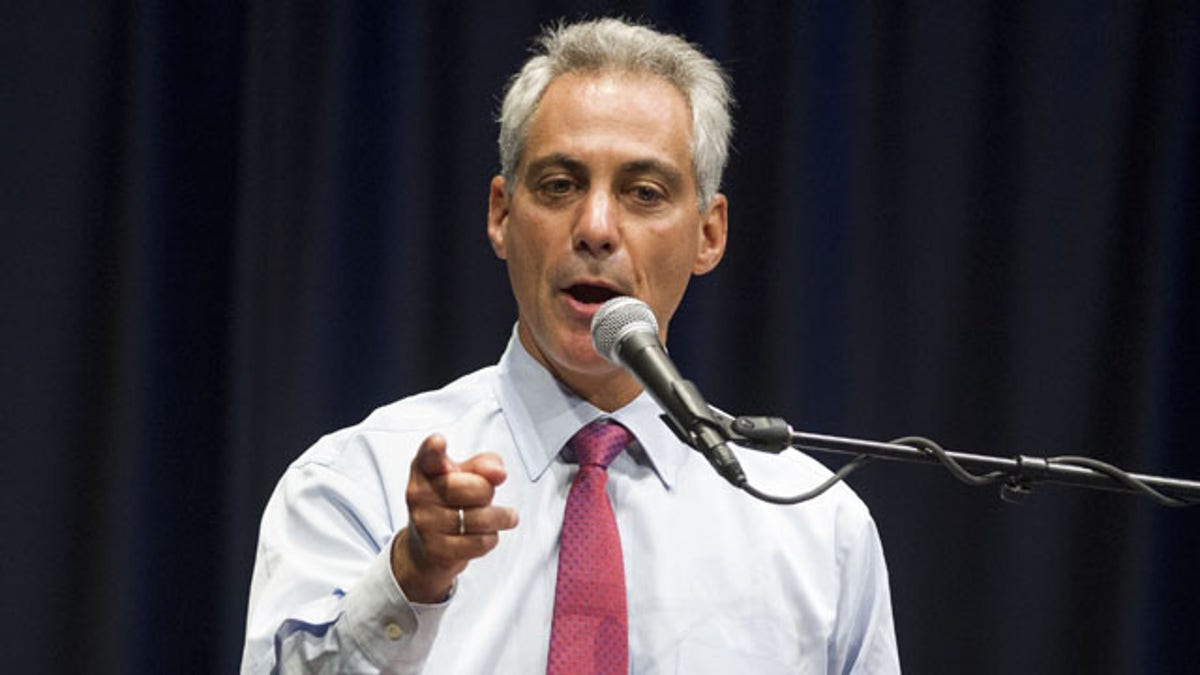
August 21, 2013: Chicago Mayor Rahm Emanuel speaks to members of the Safe Passage program during a training session at Chicago State University. (AP Photo/Scott Eisen)
Thousands of Chicago Public Schools students will head to new schools Monday, the first day of what Mayor Rahm Emanuel has called "a new beginning" for the nation's third-largest district.
As they go, many will be accompanied by some unfamiliar faces: A crop of newly hired workers in yellow reflective vests, Chicago firefighters and even the security guards from local public libraries, all of them expected to stand guard to ensure kids get to and from school safely.
The effort known as Safe Passage -- which stations workers and others along designated routes to help students who must cross gang boundaries -- is perhaps the most visible sign of how much is at stake for students in a district that has long struggled academically and financially, as well as for a mayor who has vowed since taking office that he would turn things around.
"Safe Passage is about more than just building a route to school," Emanuel told about 1,000 people during a training session last week. "It is about building a route to college, career and beyond, so that once our kids get to school, they get the world-class education they deserve."
The Chicago Board of Education -- hand-picked by Emanuel -- voted in May to close about 50 elementary schools and programs, a move Emanuel and schools CEO Barbara Byrd-Bennett said would allow the district to improve academics and help pay down a $1 billion budget deficit.
That followed an agreement with the Chicago Teachers Union to expand the school day, which Emanuel said was among the nation's shortest, and the announcement that for the first time, every CPS school could offer full-day of kindergarten. Those changes also begin Monday.
"That's a new chapter," Emanuel said. "There is a new beginning."
Critics of the school closings said minority students were disproportionately affected and that many students would now have to cross dangerous gang boundaries. Some families sued, but a federal judge recently refused to halt the plan.
CPS announced it would expand the Safe Passage program that already was in place at 35 high schools and four elementary schools -- buildings that district officials say have seen a 7 percent increase in attendance and a 20 percent decrease in crime since Safe Passage began.
Chicago police worked with residents and CPS to map out routes in 52 of the so-called "welcoming schools" -- those buildings taking in students whose schools were closed. Bright yellow signs have been posted along the routes and maps were distributed to parents and guardians.
CPS hired an additional 600 workers at a rate of $10 per hour to guard the routes; they'll wear bright yellow reflective vests with the words "CPS Community Watch" printed across the back.
Emanuel also deployed city departments to repair sidewalks, replace street lights, paint over graffiti and board up nearly 300 abandoned buildings along the routes.
Schools themselves also saw improvements, including upgraded air conditioning and new libraries and computer labs, even as CPS in recent months has laid off more than 3,000 teachers and staff due to budget issues.
CPS students also saw the start of school disrupted last year, when teachers went on strike in for more than a week in early September.








































